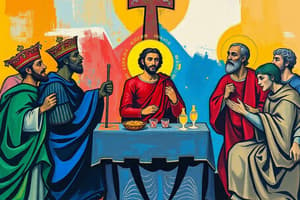Podcast
Questions and Answers
What significant role did St Anthony play in Christianity?
What significant role did St Anthony play in Christianity?
- He translated the Bible into Latin.
- He started Christian monasticism in the 3rd century. (correct)
- He was the first Pope of the Roman Empire.
- He initiated the practice of hermit life.
Which emperor granted Christianity legal status?
Which emperor granted Christianity legal status?
- Augustus
- Constantine (correct)
- Theodosius
- Nero
What is the Benedictine rule known for?
What is the Benedictine rule known for?
- Providing guidelines for monastic life. (correct)
- Documenting Christian theology.
- Promoting hermitic lifestyles.
- Establishing the first Christian community.
What did Theodosius accomplish regarding pagan practices?
What did Theodosius accomplish regarding pagan practices?
What is St Jerome best known for?
What is St Jerome best known for?
How did the numerous persecutions impact early Christianity?
How did the numerous persecutions impact early Christianity?
What was the role of the Church Fathers during the spread of Christianity?
What was the role of the Church Fathers during the spread of Christianity?
Which statement about monasticism is true?
Which statement about monasticism is true?
Flashcards
St. Augustine's Life Period
St. Augustine's Life Period
Lived from 100-337 AD, a key period in early Church history.
Christianity's Status in the Roman Empire
Christianity's Status in the Roman Empire
Christianity was the largest single religion, yet scattered throughout the world.
Constantine's Impact
Constantine's Impact
Roman Emperor Constantine granted Christianity freedom.
Theodoseus's Role
Theodoseus's Role
Signup and view all the flashcards
Church Fathers
Church Fathers
Signup and view all the flashcards
St. Jerome's Contribution
St. Jerome's Contribution
Signup and view all the flashcards
Monasticism's Importance
Monasticism's Importance
Signup and view all the flashcards
Growth of the Church
Growth of the Church
Signup and view all the flashcards
Study Notes
Christianity in the Roman Empire
- Christianity became the largest single religion in the Roman Empire.
- Christian communities were scattered throughout the world.
Roman Emperor Constantine
- Roman Emperor Constantine granted Christianity liberty after a vision.
- Theodosius ended all pagan practices and temples.
Church Fathers and Theologians
- Church fathers became intellectual and theologians.
- Saint Jerome translated the Bible into Latin (Vulgate).
Monasticism
- Monasticism became a religious channel for the people.
- Saint Anthony started Christian monasticism in the 3rd century.
- Saint Benedict brought order to the monastic movement.
- Benedictine Rule provided guidelines for those joining monastic life.
Spread of Christianity
- Christian communities spread their faith and devotion.
- Persecution inspired more believers.
- Constantine's granting of liberty to Christians was crucial.
- Formal church government was established.
- Christian theologians influenced the understanding of the church.
Pope John XXIII and Aggiornamento
- Pope John XXIII called for Aggiornamento, aimed at reviewing the word of God and church practices.
- The Church conducted a self-examination in its 2000-year history.
- The Church aimed to obey the Holy Spirit, preach the Gospel, teach the faith.
- The Church also aimed to continue Vatican work, address modernity, return to the sources, teach balanced ecclesiology, highlight the work of the laity, encourage holiness, facilitate active participation in liturgy, and reach non-Catholics.
Studying That Suits You
Use AI to generate personalized quizzes and flashcards to suit your learning preferences.




